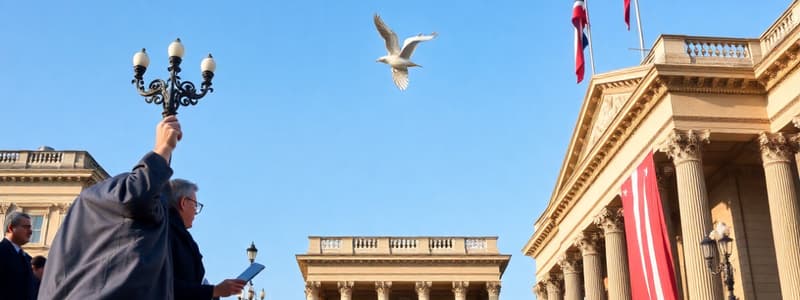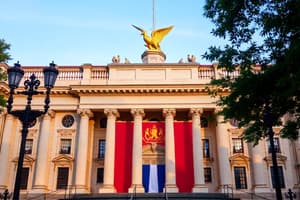Podcast
Questions and Answers
Define the term 'state'.
Define the term 'state'.
A defined sovereign territory that governs itself, utilizes legitimate force to govern, reaches into the citizens' lives through bureaucratic powers, and claims the monopoly of the legitimate use of physical force.
What are the two contrasting types of state power according to the sociologist?
What are the two contrasting types of state power according to the sociologist?
Despotic power and infrastructural power.
What is despotic power of the state?
What is despotic power of the state?
The ability of the state to enforce decisions without input from society.
Which of the following are examples of despotic power?
Which of the following are examples of despotic power?
What is infrastructural power of the state?
What is infrastructural power of the state?
Which of the following are examples of infrastructural power?
Which of the following are examples of infrastructural power?
Is the state separate and distinct from civil society and nation?
Is the state separate and distinct from civil society and nation?
What was the primary reason for the formation of modern European states?
What was the primary reason for the formation of modern European states?
Which of the following were features of the formation of modern European states?
Which of the following were features of the formation of modern European states?
What is the key difference between imperialism and colonialism?
What is the key difference between imperialism and colonialism?
What are the similarities between totalitarian and authoritarian regimes?
What are the similarities between totalitarian and authoritarian regimes?
Define 'totalitarianism'.
Define 'totalitarianism'.
Define 'liberal democracy'.
Define 'liberal democracy'.
Define 'welfare state'.
Define 'welfare state'.
Define 'nation'.
Define 'nation'.
Can there be more than one nation within a state?
Can there be more than one nation within a state?
What are 'political nations'?
What are 'political nations'?
Define 'nation-state'.
Define 'nation-state'.
How are governments best described?
How are governments best described?
What distinguishes the state from the government?
What distinguishes the state from the government?
Flashcards
Define State
Define State
A defined sovereign territory which governs itself and monopolizes legitimate use of force.
Despotic Power
Despotic Power
State's ability to enforce decisions without societal input, typical in authoritarian regimes.
Infrastructural Power
Infrastructural Power
State's ability to effectively enforce policies and penetrate society through institutions.
Examples of Despotic Power
Examples of Despotic Power
Signup and view all the flashcards
Examples of Infrastructural Power
Examples of Infrastructural Power
Signup and view all the flashcards
State vs Civil Society
State vs Civil Society
Signup and view all the flashcards
Modern European State Formation
Modern European State Formation
Signup and view all the flashcards
Imperialism vs Colonialism
Imperialism vs Colonialism
Signup and view all the flashcards
Totalitarian Regime
Totalitarian Regime
Signup and view all the flashcards
Authoritarian Regime
Authoritarian Regime
Signup and view all the flashcards
Liberal Democracy
Liberal Democracy
Signup and view all the flashcards
Welfare State
Welfare State
Signup and view all the flashcards
Nation
Nation
Signup and view all the flashcards
Multiple Nations in a State
Multiple Nations in a State
Signup and view all the flashcards
Political Nations
Political Nations
Signup and view all the flashcards
Nation State
Nation State
Signup and view all the flashcards
Governments Defined
Governments Defined
Signup and view all the flashcards
State vs Government
State vs Government
Signup and view all the flashcards
Nationalism
Nationalism
Signup and view all the flashcards
Legitimacy in Power
Legitimacy in Power
Signup and view all the flashcards
Political Allegiance
Political Allegiance
Signup and view all the flashcards
Total Control
Total Control
Signup and view all the flashcards
Checks and Balances
Checks and Balances
Signup and view all the flashcards
Civil Liberties
Civil Liberties
Signup and view all the flashcards
Sovereignty
Sovereignty
Signup and view all the flashcards
Taxation in Modern States
Taxation in Modern States
Signup and view all the flashcards
Meritocracy in Governance
Meritocracy in Governance
Signup and view all the flashcards
Study Notes
State Definition & Power
- A state is a sovereign territory with the authority to govern itself. It uses legitimate force to rule and has the power to interfere in its citizens' lives via bureaucracies.
- The state claims a monopoly on the legitimate use of force.
Despotic vs. Infrastructural State Power
- Despotic power: The state's ability to make and enforce decisions without societal input. This often involves authoritarian control.
- Examples of despotic power: Centralized authority, lack of checks and balances, coercion (military, police), surveillance, weak societal influence.
- Infrastructural power: The state's ability to influence society through institutions.
- Examples of infrastructural power: Strong institutions (courts, police, taxation), capacity to implement policies effectively, public engagement, democratic processes, and clear systems of governance and accountability. This power works through legitimacy.
State vs. Civil Society/Nation
- The state is separate and distinct from civil society and the nation.
Modern European State Formation
- Modern European states emerged from the need for war preparation. This necessitated:
- Professional armies
- Taxation
- Population control
- Consolidation of power into monarchies
- Officials to manage finances & strategies
- Merit-based positions rather than birthright.
Imperialism vs. Colonialism
- Both involve exerting control over other countries, but
- Colonialism includes physical occupation, settlement, and often displacement of the original population.
Totalitarian vs. Authoritarian Regimes
- Both consolidate power, limit citizen participation, and control state media. They suppress freedom of speech and assembly. Leaders are above the law.
- Totalitarian Regimes: Total control over politics, society, economics, and personal beliefs and ideology. Strict oppression, violence, murder, cult-like following of a leader
- Authoritarian Regimes: Control over political power but allow some social and economic freedoms. Relies on a single ruling party/dictatorship/monarchy.
Liberal Democracy
- A political system combining democratic governance with individual rights and freedoms.
- Key tenets: Fair elections, government accountable to the law, and protection of freedoms like speech, press, religion, assembly.
Welfare States
- Governments providing social and economic protections to citizens—social security, wealth distribution, and minimal standards of living.
Nation
- A group of people identifying as a distinct unit, with shared identity and a sense of common culture and belonging. This is an imagined community.
Multiple Nations in a State
- It is possible for a state to contain more than one nation.
Political Nations
- Nations based on political allegiance & agreement on the rules and how to live.
Nation-State
- A rare case of a state containing only one distinct nation. (e.g., Japan).
Governments & Regimes
- Governments are regimes of power (the current ruling structure) at any given moment.
State & Government Differences
- State: Permanent political entity (territory, population, government, sovereignty).
- Government: Temporary authority running the state, making and enforcing laws, often elected officials.
Nationalism
- Strong devotion to, and pride in, one's country. It often promotes national unity and citizens might even willingly sacrifice for it.
Studying That Suits You
Use AI to generate personalized quizzes and flashcards to suit your learning preferences.




